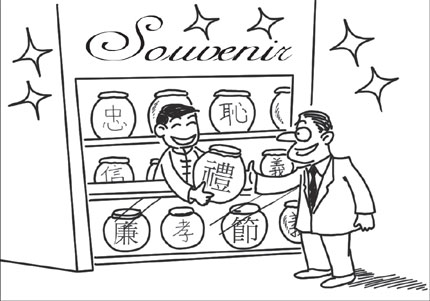China's cultural commodities project soft power globally
- By Wu Xia and Chen Junfeng
 0 Comment(s)
0 Comment(s) Print
Print E-mail
Shanghai Daily, December 22, 2011
E-mail
Shanghai Daily, December 22, 2011
|
|
|
By Zhou Tao/Shanghai Daily |
As Christmas approaches, Westerners are busy shopping for gifts to give to family and friends on the most important holiday of the year.
A "Chinese" Christmas, for most Western families, is not something new: many products they buy during the holiday, such as toys, sporting goods, laptop computers, DVD players and winter wear such as scarves, shawls and down coats, are actually made in China.
Sara Bongiorni, a columnist from the US state of Louisana found out seven years ago that 25 out of the 39 Christmas gifts she purchased were made in China. Our life is now closely connected with China, she wrote.
French writer Erik Izraelewicz also wrote that on Christmas Eve, not only are the gifts heaped up under Christmas trees made in China, but so are the ornaments such as balls, lights and small figures that decorate the tree.
China's economic progress has deeply affected the lives of people around the world.
However, a country cannot join the club of the advanced countries if it's prosperous only in its economy and not in its culture.
In October 2011, the sixth plenary session of the 17th central committee of the Communist Party of China charted the future for China's rise in cultural power.
The "becoming Chinese" example of the Christmas tree is symbolic for Western culture since it is one of many signs of China's economic rise.
In just a few decades since the 1978 reform and opening up, China became the world's second-largest economy in 2010.
A country once dependent on foreign goods, China has now become a global factory producing more than 210 key industrial products. IT items such as cell phones, computers, and digital cameras account for about half of the global market share.
The domestic car industry enjoys the world's largest output and sales, exceeding 13 million units. Steel output is larger than the sum of that in the second-, third- fourth-place countries.
China's output of refrigerators, air conditioners and color TVs is the highest in the world. At the same time, China's output of cement tops the world with half of the global market share.
In the 1980s, China's annual foreign investment was only a small 450 million yuan (US$71 million today). In the 1990s, foreign investment stagnated at an annual US$2.3 billion, while in 2008 it soared to US$55.6 billion.
From "Made in China" to Chinese capital, the country has made a big step forward. Now, China is launching a new endeavor.
The enormous progress of the economy has provided a solid foundation for the prosperity of the culture, and whether the culture prospers also affects the depth and quality of economic development.
In 1990 Harvard Professor Joseph Nye invented the concept of "soft power" and the core of the power is culture.
A new industry
From past to present, culture has always been a source of power for national growth and revitalization. The current world witnesses culture increasingly interconnected with the economy, and more complex and fierce competitions of comprehensive national power. A powerful country must possess an advanced and influential culture.
Many countries are trying every means possible to expand their cultural capacity. The United States, European Union member countries, Japan, Korea, and Singapore are all active players in the new-round competition in cultural soft power.
At the same time, their cultures have not only grown in the form of an industry and reached global audience, they also have become a pillar in the national economy.
Culture also is an important force in safeguarding national security. Facts have shown that if a people or a country loses its culture, it loses its cultural defense and its foundation of existence.
After the Cold War, the hard political and military conflicts between the world's big countries were replaced by soft conflicts between their cultures. Culture has become an important instrument for Western countries to topple and control the regimes in other countries.
The Revolution of 1989 in Central and Eastern European countries, the Color Revolutions in Central Asia, and the Jasmine Revolution in North Africa are good examples.
China, a country that has achieved economic miracles and has 5,000 years of civilization, cannot fall behind in competition involving culture. The strategic decision of the central committee of the Chinese Communist Party to build a strong socialist cultural nation calls for a cultural awakening and rejuvenation and charts out the future of a new endeavor.
Zhou Lingyan, principal of the Confucius Institute in Mexico City, said China and Mexico are far apart in geography, and "although distance makes beauty, it also produces misunderstanding." Culture is a medium that best shortens the distance between different peoples and countries and promotes understanding and friendship between them.
In the 21st century, China is bringing its culture to the world at a steadier pace.






